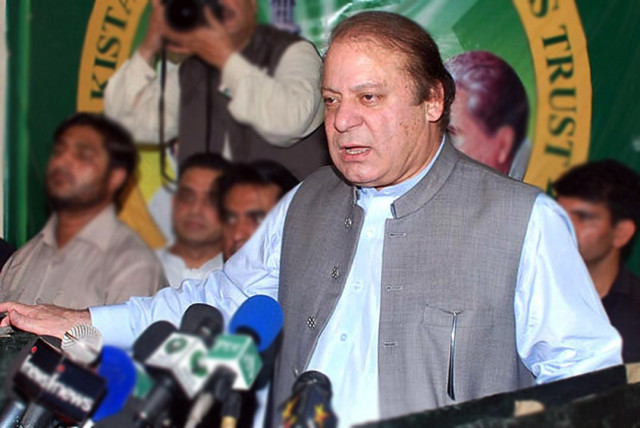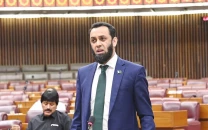Candid talk: No quick fix to energy crisis, says PM-in-waiting
Nawaz says it’s naïve to think load-shedding will end on June 6.

“The Thar coal reserves are sufficient to meet the country’s power requirements for at least 100 years,” says Nawaz Sharif.
It’s ironic that a country that has nuclear weapons has no electricity, says prime minister-in-waiting Nawaz Sharif as the interim administration helplessly watches the exasperating power crisis spiral out of control.
But Nawaz offers no quick fixes, no miracles.
“Don’t expect me to overcome load-shedding overnight,” he told a ceremony marking the 1998 nuclear tests by Pakistan. This annual feature, dubbed Youm-e-Takbeer, celebrates the then premier, Nawaz Sharif’s decision to defy international pressure and conduct nuclear tests on May 28, 1998.
Nawaz’s faction of Pakistan Muslim League (PML-N) is all set to form the new federal government after winning majority in the May 11 elections.
The two-time former premier called for patience, saying that it would be naïve to think that June 6 – the day he is scheduled to be formally sworn in – would herald the end of the perennial power crisis in the country.
However, he assured the audience that his administration would undertake new projects in the energy sector and ensure their timely completion.

“Everyone asks me about a solution to the power issue. I say that we will work with dedication and sincerity to fix it,” he added. “A visible change will be seen after short-term measures of the new government.”
Nawaz said that although Pakistan had become a responsible nuclear power after the 1998 detonations, it was still facing the worst form of load-shedding. “What [will] others say? The atomic power has no electricity!”
The incoming premier said that he has been whole-heartedly engaged in how to rid the country of this problem for the past 18 days. “We could set up coal-based plants in Karachi, but this, too, will take two or three years,” he added. “The Thar coal reserves are sufficient to meet the country’s power requirements for at least 100 years.”
Talking about hydel power, Nawaz said: “We need $10 to 15 billion for the construction of new dams, but the government does not have [even] $1billion,” said Nawaz. “[However], I assure [you] I will work day and night.”
He dropped a broad hint that his administration would not undertake the controversial Kalabagh Dam project. “Someone asked me to construct Kalabagh Dam but, right now, the construction of Bhasha Dam is under way,” he added.
He believes that if all existing power plants are operational, and the theft of oil and electricity stops, the frequency and duration of load shedding could be decreased significantly.
Economic boom in the waiting
The deepening power shortages have stoked violent protests and cost hundreds of thousands of jobs in a country already plagued by high unemployment, a failing economy, widespread poverty, sectarian bloodshed and a Taliban insurgency.
The incoming premier promised to steer the economy out of the time warp. Taking credit for making Pakistan a nuclear power, Nawaz said that in his third term as prime minister he would drop ‘an economic bomb’, meaning that his administration would bring about an economic turnaround.
About the Chinese Premier Li Keqiang’s last week visit, Nawaz said that the Chinese leader told him that his [Nawaz’s] name was very familiar in China. “The people of China consider you as a close friend and they will like to work with you closely,” Nawaz quoted the Chinese premier as saying.
Cognizant of the myriad of challenges, the incoming prime minister said: “I am a little confused. Should I repay loans, teach Pakistani children, provide electricity and employment, end load-shedding, or focus on development works?” However, he pledged to try and tackle all these challenges simultaneously at the expense of his own leisure.
A victorious party
Nawaz expressed satisfaction at the outcome of the May 11 elections. “The people of Punjab have given a mature decision. It is an emotional one in Khyber-Pakhtunkhwa and traditional in Sindh, while in Balochistan the situation is in favour of the PML-N despite tribal traditions,” he added.
In Punjab, the PML-N had almost clean-sweep, in K-P however, Imran Khan’s Tehreek-e-Insaf emerged as a single largest party, while the Pakistan Peoples Party retained its traditional stronghold of Sindh despite a drubbing elsewhere in the country.
“Fraction mandate is not anew thing in the world but when it comes to Pakistan, it requires a stable government which has the writ and ability to counter the issues successfully,” he added.
Published in The Express Tribune, May 29th, 2013.



















COMMENTS
Comments are moderated and generally will be posted if they are on-topic and not abusive.
For more information, please see our Comments FAQ